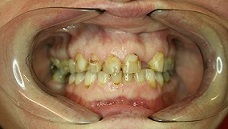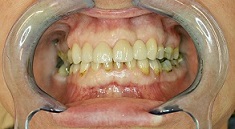Book a dental appointment
Dental crowns
A dental crown is a tooth-shaped artificial cap. Dental crowns are placed if the crown part of the patient’s tooth needs restoration or adjustment. The crown part may require extensive or partial restoration. To place a dental crown, the patient’s tooth is polished thinner and shorter by about a millimetre. During the next visit (~ a week later), the dental crown will be cemented to the prepared tooth. If the crown part of the tooth is significantly damaged or destroyed, it is recommended to place a post in the tooth root. A post gives support to the crown and improves its durability. To place a post, the root canal is enlarged to give enough space for placing a post. After placement of a post, the stump of the tooth is restored and the impression of teeth is taken. The impression is sent to the laboratory where a dental technician prepares the dental crown. During the next visit, the dentist attaches the crown to the tooth.
Fitting tooth crowns helps successfully adjust the height of occlusion, position and colour of teeth. It may be necessary to place a crown after root treatment to ensure sufficient strength against masticatory force.
Generally, there are two types of tooth crowns: all-ceramic and metal ceramic crowns.
All-ceramic dental crowns:
the advantages of these crowns are more natural colour, better durability and minimal allergenicity. The natural look of all-ceramic crowns is due to the fact that light refracts on these crowns as on natural teeth. The extent of restorations is limited because the materials used are brittle.
 Taastamise eelselt |
 Hambakroonidega |
Metal ceramic dental crowns:
these crowns may cause more complications especially due to the materials and factors that influence the materials in the oral cavity. Metal may gradually lose its initial strength thereby influencing the durability of the crown. Metal ceramic crowns have a metal alloy base and ceramic exterior. A disadvantage of these crowns is that they are prone to chipping.
Metal used in metal ceramic crowns makes this type of crowns robust enabling extensive restorations.
Four main reasons for getting dental crowns
- When a tooth is dying.
- When a tooth is broken.
- When a filling is no longer sufficient.
- When a tooth has changed colour
What to consider when crowning teeth?
- If the tooth has a live nerve, there is a risk that the tooth will remain sensitive after being filed down.
- Bacteria tend to accumulate under the edges of the crown and cause tooth decay.
- Under an artificial crown, the lifespan of a tooth is up to ten years.
- Ceramic crowns can chip.
Read more about our other dental treatment services here.
Read more about dental crowns here.
